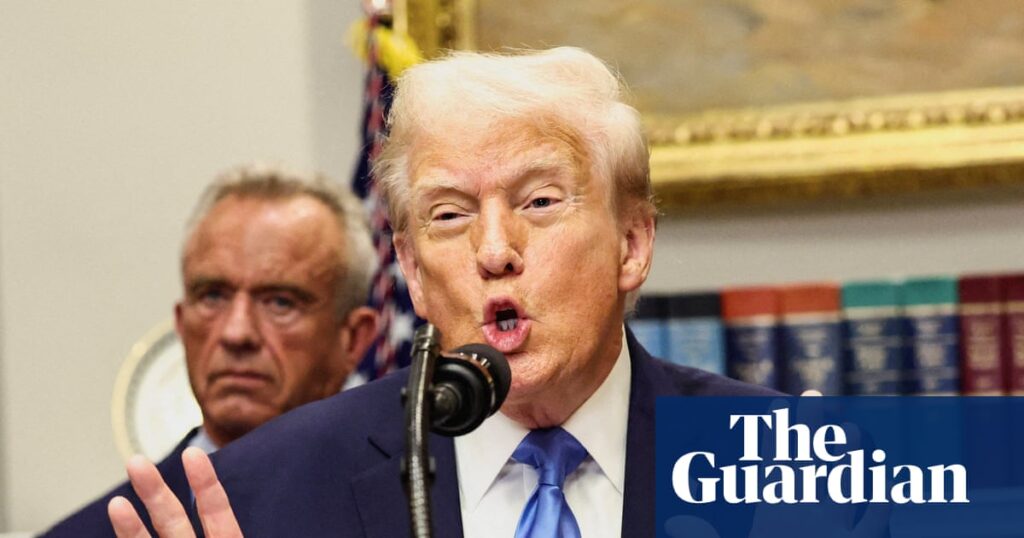Australia must “step up to prevent catastrophic and preventable loss of life” after US funding cuts to national and global health programs and institutions, a former director of the US Centers for Disease Control and Prevention says.
Dr Tom Frieden, who served as director of the CDC until 2017 under Barack Obama, spoke to Guardian Australia about what countries that share close partnerships with the US need to do after a series of executive actions and cuts under president Donald Trump.
From day one of his second term in office, Trump sought to freeze foreign aid, including dissolving the US Agency for International Development (USAID).
He ordered that the US withdraw from the World Health Organization (WHO); proposed a more than 50% reduction in CDC funding; eliminated 2,400 CDC jobs (about 700 of those roles have since been reinstated), and slashed the staff and budgets of the Food and Drug Administration (FDA) and National Institutes of Health (NIH).
In February, the anti-vaccine activist Robert F Kennedy Jr was appointed as the US secretary of health and human services, despite holding no formal health credentials, and has since pushed vaccine misinformation. Since then, more than US$1bn in funding cuts have been made to Gavi, a global alliance that helps buy vaccines for the world’s poorest children.
“The CDC has long been a cornerstone of collaboration, information sharing, expertise and rapid response capacity,” Frieden says.
“When those systems are dismantled, there can be life-and-death global consequences. The US decision to stop funding Gavi and cut other global health programs is heartbreaking and could cost millions of lives, especially of children.”
Over the next decade, US cuts to health aid for tuberculosis and HIV programs alone could result in “millions of additional childhood tuberculosis cases and deaths” in low and middle-income countries, according to a paper published in October in The Lancet Child & Adolescent Health Journal.
“Halving malaria and tuberculosis funding and cutting support to WHO undermines decades of progress and weakens our collective defence against future pandemics,” Frieden says.
“Health is not a zero-sum game. When one country is healthy, it strengthens its neighbours and the world. If the US retreats, others must step up to prevent catastrophic and preventable loss of life.”
Sign up for a weekly email featuring our best reads
A spokesperson for the Australian government’s Department of Health, Disability and Ageing says investing in global health is essential “… to better protect the health and wellbeing of the Australian community, our region and the world”.
The WHO is undergoing a comprehensive restructure as a result of the US funding cuts, and the spokesperson says Australia is “taking an active role in WHO’s strategic realignment and reprioritisation, including focusing its efforts on country-level activities, providing a hub for global health data, responding to health emergencies, and normative work and technical standards”.
At a national level, the establishment of an Australian CDC, set to launch in January, will provide independent, transparent and evidence-based public health advice, “bringing together critical information and experts from across government,” the spokesperson says.
“It will work with international counterparts, and state and territory governments as a centre of technical expertise.”
Frieden says it is essential for countries to invest in their own disease surveillance systems, as Australia is doing in forming its own CDC.
He adds: “The foundation of every resilient health system is primary health care; it’s the most cost-effective, efficient and high-impact way to save lives.
“Investing in primary health care, along with robust disease surveillance, laboratory capacity and rapid data sharing, builds preparedness.”
after newsletter promotion
The director of infectious diseases at Monash Health, Prof Allen Cheng, previously served as co-chair of the Australia Technical Advisory Group on Immunisation, and was chair of the Advisory Committee for Vaccines, advising Australia’s Therapeutic Goods Administration on vaccine regulation.
Cheng says that although Australia does consider US guidance and decisions when approving medicines or setting health guidance, “Australia generally has the capacity to make its own decisions” and works with international agencies beyond the US.
“I’m less concerned about the impact on Australia than for other countries with less resilient health systems – the Ebola outbreak in DRC for example,” Cheng says.
“There is often a small window to get control of outbreaks early, and the US CDC is often involved early,” Cheng says.
“While public health workers locally and from other countries hopefully will respond effectively, it doesn’t help if the CDC aren’t able to help.
“And while the risk to Australia from Ebola in DRC is very low, that could well change if an outbreak progresses.”
He says the Australian CDC will have some work to do in building trust to counter a “flood of disinformation” coming from once-trusted US health institutions.
“We would usually regard advice from governments and public health agencies to be credible and reliable, but we’re now having to look twice at everything coming from the US to check.”
Frieden also warns that cuts to staffing and funding to US health agencies could make it harder for those agencies to review new drugs thoroughly, something other countries will need to be aware of.
“Misinformation can put pressure on the agency to make decisions based on ideology instead of evidence,” Frieden says. “We’ve already seen this with the FDA’s decision not to authorise Covid vaccines for healthy children and pregnant women.”
But he believes that “evidence, persistence and truth can overcome even the most entrenched opposition”.

